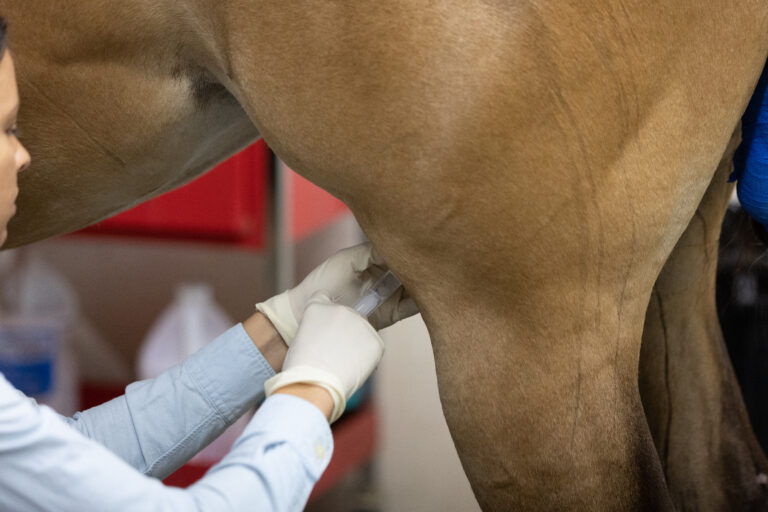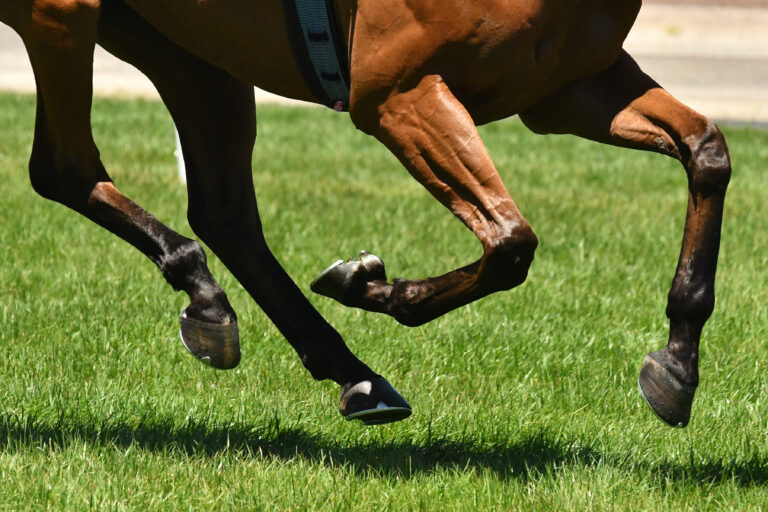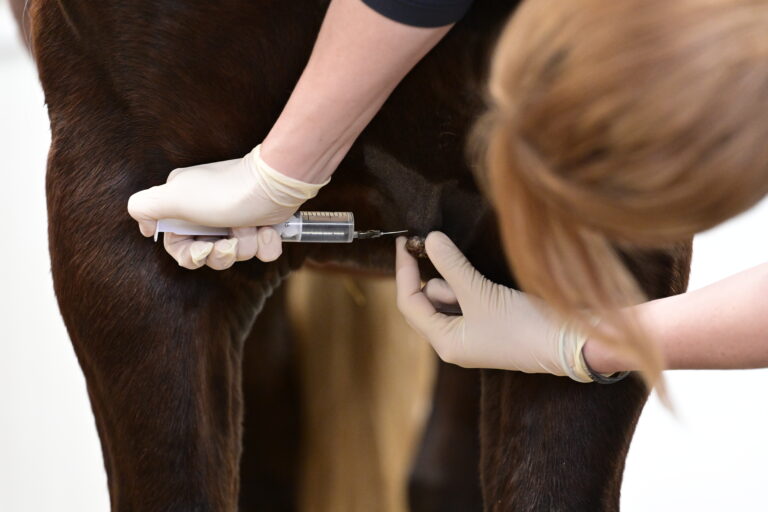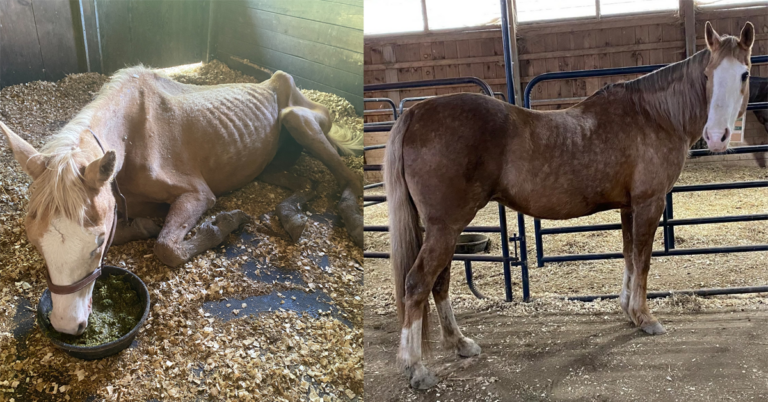
Can the more than 40% of AAEP members who are solo practitioners hire effective remote veterinary office staff? Stephanie Vassar, VMD, CVMMP, founded Great Falls Equine & Veterinary Services in Massachusetts in 2015. She has grown her practice to have two part-time helpers on the road and a part-time office staff member who lives in another state and works from home.
On the road she has a certified vet tech and an assistant with a great skillset. She said the two-tech model “increases my efficiency. One can invoice, one can pack up and I have client face time. It cuts five to 10 minutes from each appointment, especially if I’m doing X-rays or ultrasounds.”
Sound like a solution you hadn’t thought about? Listen to the podcast to hear how Vassar found the right remote veterinary office staff member and what is required to have that position work.
Starting in Practice
Vassar started her own practice two years out of veterinary school. She now is the mother of two children. When her first child was born, she couldn’t get him into day care until he was six months old. She hired a horse “handler” to help her on the road. However, Vassar said the person “over-estimated their horse-handling ability.” That emphasized the necessity to hire into her practice very cautiously.
Vassar’s practice has her on the road Monday, Tuesday and Thursday. Wednesdays and Fridays are for “bumps” (horses that could not be see on the regularly-scheduled days) and emergencies. While she doesn’t pay her tech and assistant for Wednesdays and Fridays when they aren’t working, “I pay more for when I have them,” she said.
But Vassar still needed her practice to be more efficient.
“I needed help with my office efficiency,” Vassar said. That included handling new client forms, labs, emails, calls and appointments.
Finding Office Help
“If I had a half-hour, I could do that,” is what Vassar said to herself about office work. The problem is she didn’t have the half-hour for each of the things that were needed.
Her solution: The Mom Project.
“It’s kind of the reverse of Indeed (a job site),” said Vassar. She said The Mom Project goes out and collects talent first. There is a minimum hourly rate. Then you can post a job and the talent can apply. Vassar said to expect “gaps” in employment as many of the remote workers are stay-at-home moms who have degrees, but didn’t want to be full-time in the job market.
“They have short-term contracts,” explained Vassar. “I needed 10-20 hours per week.”
She posted on Friday evening, and by Monday had 221 applicants.
“I looked for horse or vet tech experience,” said Vassar. “I interviewed five of 20 with horse experience.” Three of the five had Bachelor degrees.
The remote veterinary office staff Vassar hired has a BS in biochemistry. She also had been an admin in an insurance office.
“She started in July of 2022 as a three-month temp,” said Vassar.
At first the remote office staff was a 1099 contractor through The Mom Project, and all Vassar had to do was pay the invoice. “There was a mark-up (from The Mom Project), but it was worth it because of the efficiency,” she added.
After that trial period, Vassar hired the assistant on her “regular” payroll to be a remote office staff worker for her practice. Vassar said the key to having a successful remote veterinary office staff worker is “open communication with me.” She accomplishes much of that with the Grasshopper business phone app so “everyone can see who is calling.”
Vassar sent the assistant a computer that has a time clock app where she clocks in and out. The assistant doesn’t do the practice’s Quickbooks.
What It Takes
Vassar said communication on everyone’s part and accountability on her part are key to having a successful remote veterinary office staffer. “We have a shared Note app,” Vassar added. “It does take some effort on my part to make sure this works.”
The office staffer does inventory, although the vet and techs on the road are responsible for counting what is in the vehicle.
With invoices, “as long as we are doing our job,” the office staffer can do hers. “With VetLink, I have the information and she can do the Coggins,” Vassar added.
One thing that Vassar pointed out is that as an early riser on East Coast time, she has to remember that her office staffer is on a different time zone. And the staffer doesn’t get up as early as Vassar.
Vassar said she also has written SOPs (standard operating procedures). And she has been transitioning her office to paperless.
“I now spend very little time in the “office,” she said. “And I can call (the staffer) and say, ‘Call Sally to see how Peaches is doing.’ “
Sharing Advice
Vassar is friends and colleagues with Dr. Kelly Zeytoonian (whom we’ve had on this podcast). When Zeytoonian was looking for office staff, Vassar recommended The Mom Project as a source of remote veterinary office staff.
“She found an admin through The Mom Project,” said Vassar.
“You have to accept that people can get stuff done remotely,” said Vassar. “The change in the workforce (due to the pandemic) makes a difference.”
Vassar said some of The Mom Project workers have multiple jobs, or only work while their kids are in school.
About Dr. Vassar
Stephanie L. Vassar, VMD, CVMMP, founded Great Falls Equine in 2015 and is dedicated to improving the health and well-being of her patients and establishing strong relationships with her clients through open communication and client education. Dr. Vassar resides in Shelburne, Massachusetts, with her husband, Eric, and their two sons, Colton and Henry (Hank). In her spare time, Dr. Vassar enjoys riding her Irish Sport Horse, Garrybritt Ike, hiking, coaching hockey and skiing. Dr. Vassar is an active member of the American Veterinary Medical Association, American Association of Equine Practitioners, United States Equestrian Federation and United States Dressage Federation. She is also an FEI Permitted Treating Veterinarian.
A Greenfield, Massachusetts native, Dr. Vassar was raised with appreciation and compassion for animals and agriculture. She attended Deerfield Academy and Boston College majoring in Economics and Chemistry as well as competing on the Women’s Ice Hockey team. Dr. Vassar received her veterinary medical degree from the University of Pennsylvania School of Veterinary Medicine with a focus on equine and large animal medicine at the New Bolton Center. Emphasis was placed on equine and food animal medicine and surgery, large animal emergency and critical care, neonatology and reproduction.
Upon graduation, Stephanie completed an internship in Large Animal Internal Medicine at Tufts University Cummings School of Veterinary Medicine in Grafton, Massachusetts. During the year Dr. Vassar admitted after hours emergencies, managed patient care and treatment plans, led student rounds and enhanced her knowledge in diagnostics and treatment of advanced and sometimes critical cases. The internship was in conjunction with Massachusetts Equine Clinic, a five veterinarian ambulatory equine practice serving Eastern Massachusetts. At Mass Equine, Dr. Vassar’s time was spent focusing on sports medicine and lameness as well as general wellness and field emergency management. Following her internship, Dr. Vassar joined a mixed animal practice in Glastonbury, Connecticut. During this time, she refined her skills in small animal general practice and reinforced her desire to return home to the Pioneer Valley.
Dr. Vassar completed the Equine Veterinary Medical Manipulation certification course at the Integrative Veterinary Medical Institute in Reddick, Florida. This training has enabled Dr. Vassar to perform motion palpation and spinal manipulations on horses. Spinal manipulation is the appropriate term to use when describing manipulative therapy on animals. When this therapy is performed on humans it is referred to as chiropractic manipulation. Dr. Vassar is also trained in Equine Acupuncture through the Chi Institute and has thoroughly enjoyed adding this modality to her practice.




